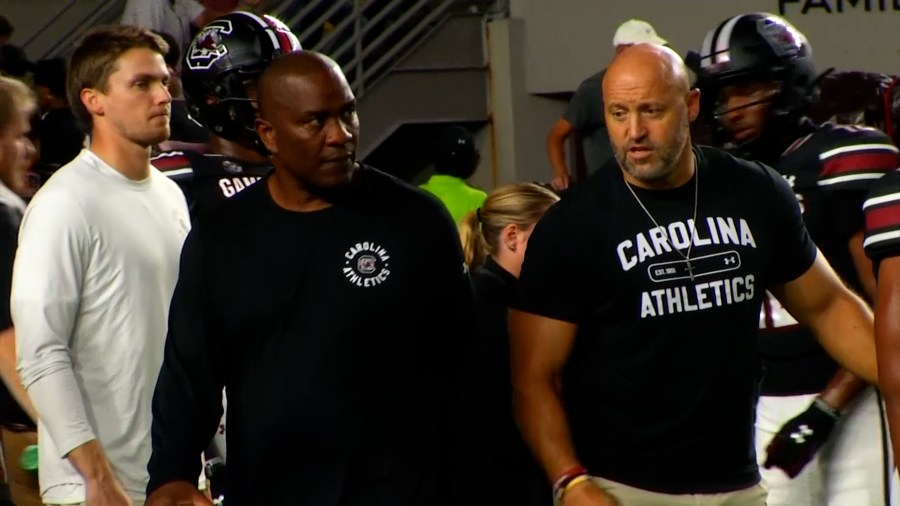USC’s Offensive Chaos: A Desperate Move That Could Ignite a Firestorm of Controversy in College Football’s Power Struggle
Shane Beamer’s decision to appoint Mike Furrey as the new play-caller for the South Carolina Gamecocks has sent shockwaves through the college football landscape. This bold move, following the abrupt dismissal of offensive coordinator Mike Shula, raises questions not only about the team’s future but also about the broader implications of such drastic changes in a high-stakes environment where performance is paramount.
The Gamecocks have struggled this season, finding themselves at the bottom of key SEC offensive statistics. This lack of offensive production has been a significant concern, especially given the expectations placed on the program. The firing of Shula, a seasoned coach with a wealth of experience, signals a desperate attempt to turn the tide. In a world where college football is increasingly viewed through the lens of business and performance metrics, such decisions can be polarizing.
Furrey, who previously served as the head coach at Limestone College, now faces the daunting task of revitalizing an offense that has struggled to find its identity. His appointment comes at a critical juncture, as the Gamecocks prepare to face the formidable Texas A&M Aggies, currently ranked third in the nation. The stakes could not be higher, and the pressure on Furrey to deliver results is immense.
LaNorris Sellers, the second-year starting quarterback, has been a focal point of the offensive struggles. His inconsistency in both the passing and running games has raised eyebrows and led to discussions about his future as the team’s leader. The transition to a new offensive scheme under Furrey could either be the catalyst for Sellers’ development or further complicate his growth as a quarterback.
The dynamics of college football coaching changes often mirror the tumultuous nature of political shifts. Just as leaders in government can be ousted for failing to deliver on promises, coaches in college football face similar scrutiny. The decision to fire Shula and promote Furrey can be seen as a reflection of the high-pressure environment in which college football operates. Programs are expected to perform, and when they fail to meet expectations, swift action is often taken.
Furrey’s past experience calling plays may provide a glimmer of hope for the Gamecocks. However, the transition period can be fraught with challenges. Players must adapt to new schemes and philosophies, and the timing of this change, just weeks before facing a top-ranked opponent, adds an additional layer of complexity. The Gamecocks will need to rally quickly if they hope to make a statement against Texas A&M.
The implications of this coaching change extend beyond the immediate performance of the team. It raises questions about the stability of the program under Beamer’s leadership. Will this move be seen as a turning point, or will it further highlight the struggles that have plagued the Gamecocks in recent years? The college football community will be watching closely, as the outcome of this decision could have lasting ramifications for Beamer, Furrey, and the entire program.
As the Gamecocks prepare for their upcoming matchup, the narrative surrounding their offensive struggles and coaching changes will undoubtedly dominate discussions among fans, analysts, and pundits alike. The intersection of sports and politics is often fraught with tension, and the world of college football is no exception. The decisions made in the coming weeks could redefine the trajectory of the South Carolina program and set the stage for future debates about coaching stability, player development, and the relentless pursuit of success in a competitive landscape.
With the Gamecocks on a bye week, the time for reflection and preparation is now. Furrey’s ability to harness the potential of his players and implement an effective offensive strategy will be put to the test against Texas A&M. The outcome of this game could serve as a litmus test for the direction of the program and the effectiveness of the changes made. In a sport where every decision can lead to triumph or disaster, the stakes have never been higher for the South Carolina Gamecocks.

Shane Beamer announced Wednesday that wide receivers coach/passing game coordinator Mike Furrey will call plays for the Gamecocks offense for the remainder of the season.
The move was prompted by the dismissal of former offensive coordinator Mike Shula, who was fired Sunday with South Carolina’s offense at or near the bottom of key SEC offensive stats.
Second-year starting quarterback LaNorris Sellers has also struggled to find consistency this season in both the passing and running games.
Beamer notes that Furrey, the former Limestone head coach, has past experience calling plays.
USC is off this week and returns to action at number three Texas A&M November 15th at noon.
Copyright 2025 Nexstar Media, Inc. All rights reserved. This material may not be published, broadcast, rewritten, or redistributed.
For the latest news, weather, sports, and streaming video, head to WSPA 7NEWS.
